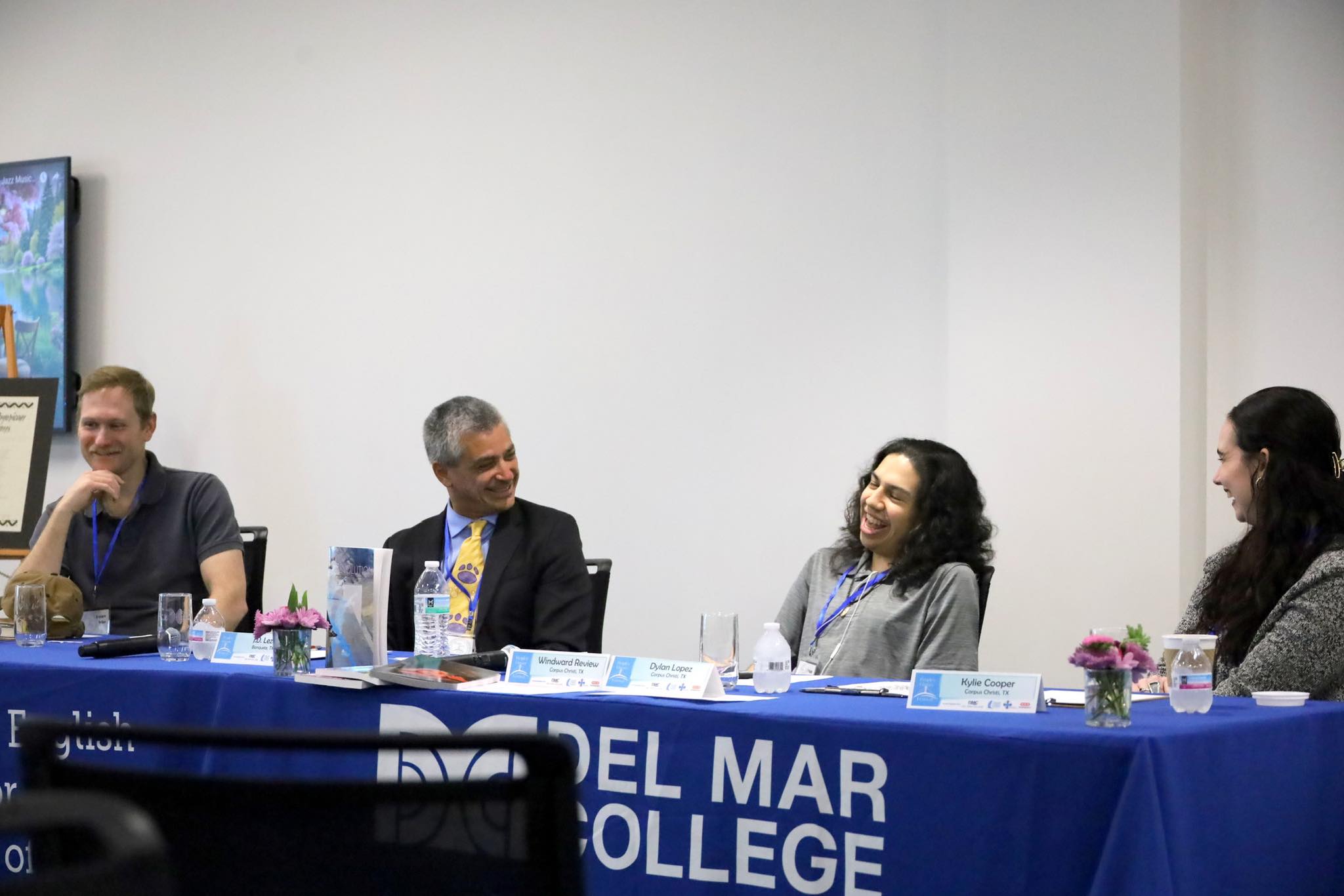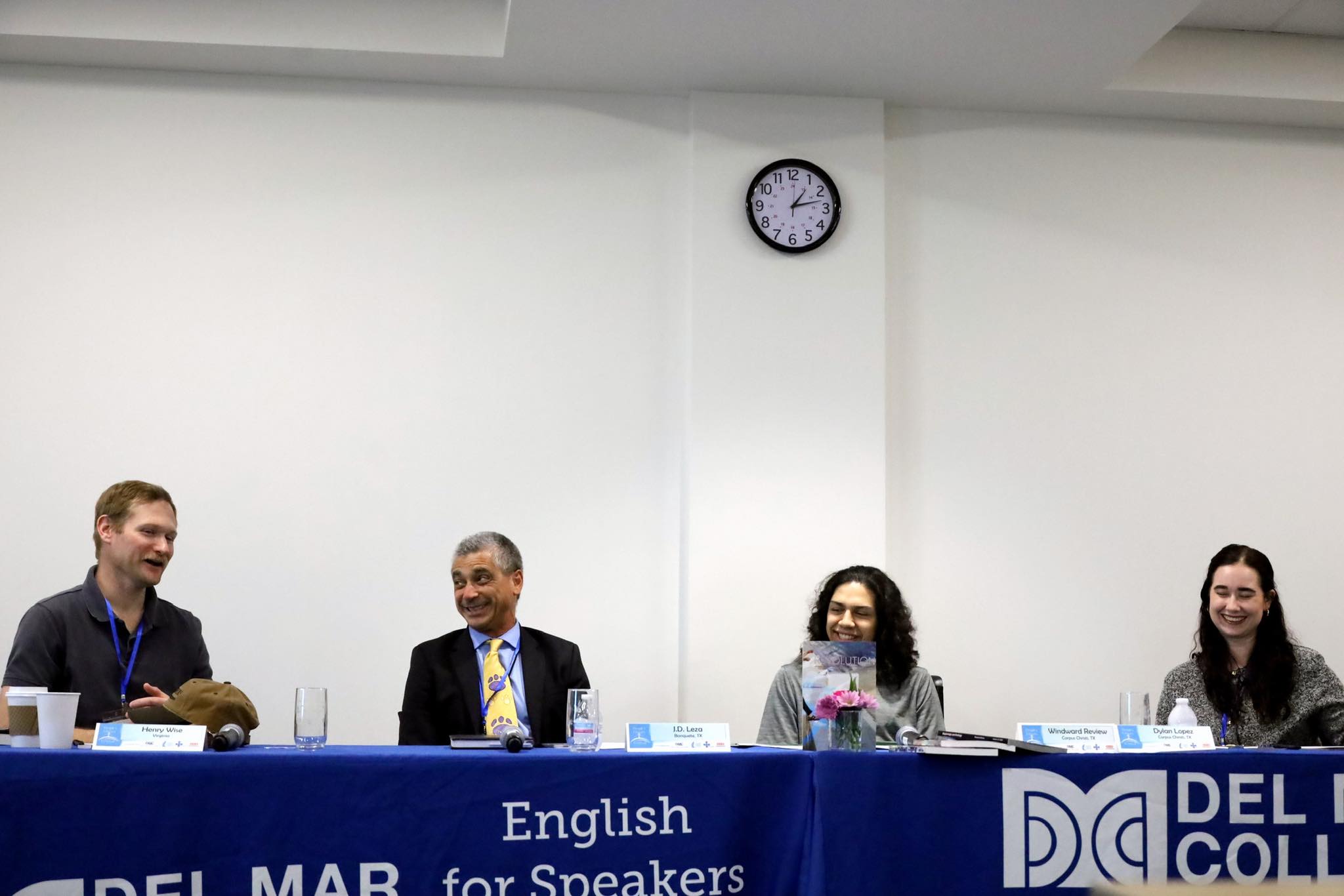People’s Literary Festival Day 1: How to get Published (Reflection)
by Dylan Lopez, Managing Editor
Dylan Lopez (3rd), Windward Review Managing Editor, speaks at People's Literary Festival 2025's "How to Get Published Panel: Cultural & Community Leadership" panel, March 8, 2025 at Del Mar College. Others pictured: Henry Wise (writer of Holy City), J.D. Leza (People's Poetry Festival Chair, moderator), and Kylie Cooper of The Bend Magazine.
Speaking on the “How to Get Published/Cultural & Community Leadership” panel at this year’s (2025) People’s Literary Festival was—as an editor—empowering, and somewhat sobering as a writer.
The panel featured Kylie Cooper, Editor-in-Chief of The Bend lifestyle magazine; Henry Wise, a burgeoning crime novelist; and me, representing the Windward Review. Our very own festival chair J.D. Leza hosted, with a great round of opening questions before offering the—sizable for a morning panel—audience the chance to ask questions of their own.
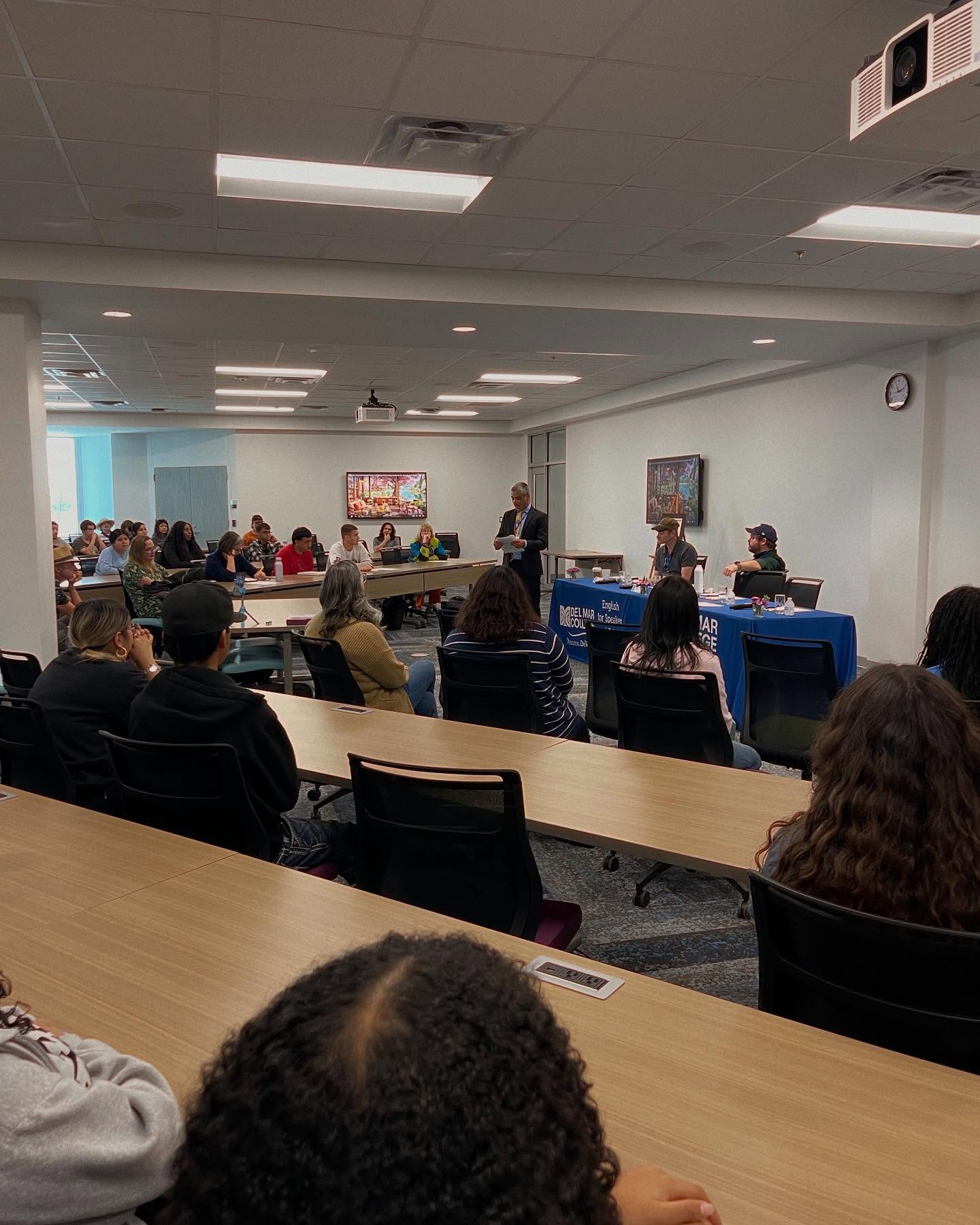
As an example of these differences, Kylie spoke at length about working with freelance writers and coordinating a small team of editors (still larger than the WR’s annual team) to produce The Bend, sourcing stories from around our local area and working on tight schedules/deadlines. Henry, on the other hand, detailed this incredible story of having his first book rejected, and Holy City rejected by agents some 84 times before being picked up and published by the 85th agent. Further, he chronicled the daily struggles of writers by telling a similar story of a friend who went through the process two hundred times before having a novel accepted for marketing/publication.
Meanwhile, our annual publication has more of a one-and-done policy with submitters, operating on a quick turnaround, acceptance or non-acceptance, with very few provisional acceptances or other wrenches in the editorial gears. Additionally, as a teaching journal, we’re responsible for training new teams of editors every Spring, and partnering with other classes/teams to round out the editorial process—it’s not all done “in-house” unless you consider the “house” to be TAMU-CC in total. Moreover, I tried to make it clear that, despite these differences in editorial processes, the Windward strives for a more empathetic/humanistic approach to editing (crediting Zoe! Creative Director of WR), which calls on us as editors to go to the extra mile—beyond industry standards—in reading submissions, responding to submitters, and fostering a safe community for our submitters/readers.
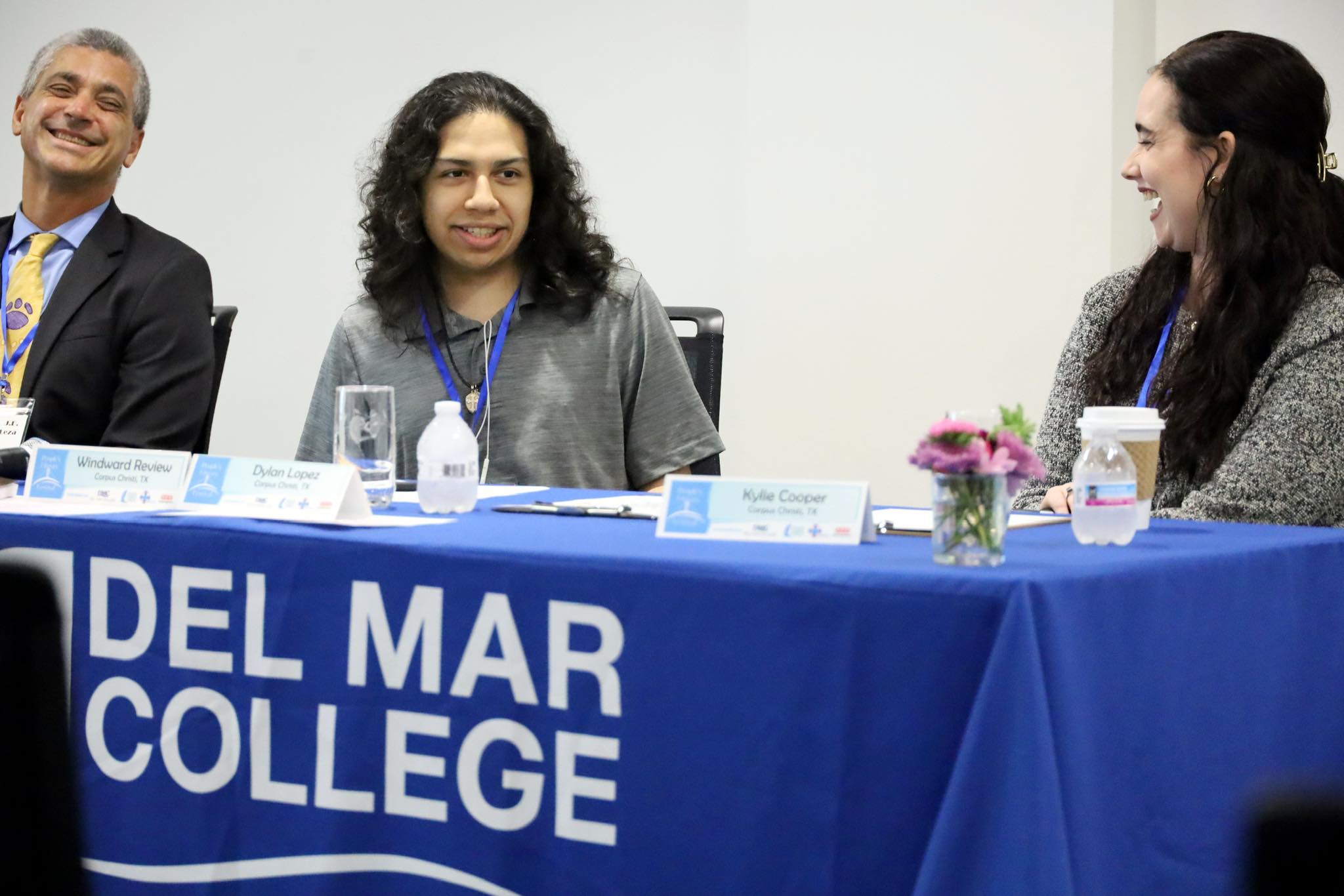
It was great, and validating to hear that the work we’re doing at the Windward is appreciated, in/beyond our blossoming literary community. We do a lot of great work, as editors—and we do more than most when it comes to our broad editorial approach/style, and commitments to our community/global conversations. Granted, it’s not necessarily something all publications/authors are able to do as easily as we are—given that we’re an institutional press with limited limitations (besides finances), but we’re a powerful example of what the literary publication landscape can be! Needless to say, I’m very proud to have been a part of the Windward’s team for so long, and to help carry out our shared mission for so many years.
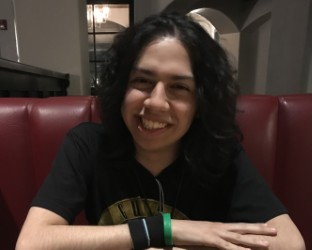 What's Next?
What's Next?
There’s plenty more to do, especially with Volume 23 as the submissions pour in. Aside from sitting on the panel and answering questions/engaging in some not-nervous witty banter with my uber-successful adult counterparts (ha-ha!), I also spoke with some event-goers and passed out around a dozen CFS flyers for Vol. 23!
On the author side of things—going back to my intro to this reflection—I think some of what Henry spoke on, specifically the struggles of authorship and the difficulty of being published made me rethink some of my academic priorities/notions of profession.
On the one hand, I’m very thankful to be finishing off my MA in a year, and diversifying my skillset from editing, creative writing, research, public speaking, teaching, etc, and not putting all my eggs in a wholly-creative basket. The percentage of folks who “make it” as full-time authors, the financial struggles they face waiting for that final acceptance/book deal to come through, and the often-necessary second, third jobs that they have to take on to make ends meet in the meanwhile sounds awfully challenging and uncertain, in our ever-more-precarious global situation. I mean, even teaching at a tertiary (or secondary) level is not a total guarantee anymore, and I currently find myself at the difficult crossroads of life: what comes next?
At the moment, I can’t say for certain. Though I am most definitely proud of all the personal, academic, creative, and professional work I’ve achieved here at TAMU-CC in the last 7 years. Seeing the Windward and PLF projects grow, being a part of Author’s Day, Young Authors, Barrio Writers and more has been a joy—and never a chore. Even if it’s never paid much, and my position at the university has never been certain/safe, I think all our little extracurriculars and projects are tremendously-vital community engagement and outreach, and demonstrate how necessary language arts/humanities are at a time when they’re (broadly speaking) under attack.
This is all to say that it’s not all doom-and-gloom for a reflection—representing the Windward Review at this year’s PLF was a great experience and, I’m still hopefully-cautiously optimistic about whatever comes next, for me as an editor, and as a writer!
A lively discussion and shared wisdom at PLF 2025 (below).
People's Literary Festival is an annual event that features readers, open mics, First Friday Art Walk events, vendors, and plenty of workshops.
PLF is always looking for committee members, sponsors, volunteers, and collaborators. Show your support by following People's Literary Festival on IG @peoplesliteraryfestivalcc, or on their website- https://peoplesliteraryfestival.com/
